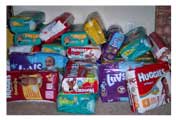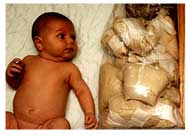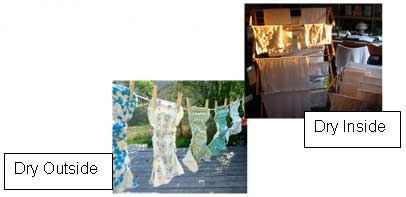Why This is Important
There are many unknowns in preparing for a pandemic. Water and electricity for washing may be unavailable. Garbage collection for disposable diapers might be interrupted. The ability to re-supply is also uncertain, as there may be a slow down in production. You may not be able to go out to get diapers, or they may be sold out.
Good hygiene is important, particularly in an already stressful situation. Clean diapers reduce secondary infections. Have a supply of diapers on hand. Additionally, learn other ways of managing your child's elimination if disposable diapers are not available. This will remove one area of concern, allowing you to focus on more pressing matters during a pandemic.
Diapers and Dealing with Waste
Plan for at least 3 months of interruption to your usual way of handling your infant's waste.  1. Disposable diapers.
1. Disposable diapers. If you use disposable diapers, stock up on three months of them – a case of diapers may last one month. Buy a size one larger than your child currently wears. (Use a too-big diaper by pulling it a little more tightly.) This way you will always have a 3 month supply the child can wear or can grow into, and you will avoid buying too many of the wrong-size diaper.

- How to dispose of them. If your trash pickup is interrupted, you will not want to have bags of soiled diapers lying around for any length of time. If left outside they will attract pests. Do not bury the soiled diapers, as they will not decompose. Instead, scrape any solid matter from the diapers into the toilet as this will leave much less to be stored in the plastic bags for eventual trash pick up. Store extra garbage bags.

2. Cloth diapers. If you do not have cloth diapers already, it would be good to have at least 6 to 8 as a backup, in case you run out of disposable and can't re-supply. In a pinch, any absorbent material would work, fastened with some safety pins or other fastener and covered with some plastic pants. Store some extra detergent for washing.
 Basic Washing Method:
Basic Washing Method: Scrape all solid matter into the toilet or wherever you are handling your own waste. Then save the diaper until you have enough for a load of wash. (No need to soak.) If heavily soiled, rinse diapers in cold water cycle (or hand wash); then run in a regular cycle (or hand) with warm or hot water and some bleach. Dry in the dryer or hang to dry.
3. Potty use 
In an extended emergency with uncertain utilities and supplies, it might make sense to potty train the child (if old enough). For infants, there is a method used in traditional cultures that may be of interest. Watch the infant carefully for cues he is about to “go” (usually a grimace, squirm, or cry) and, while carefully supporting neck and torso, hold the infant over a bowl, toilet or other container to “catch” the waste in the bowl. This method takes some time and attention, but may be preferable to hand washing diapers if fuel and/or water are scarce.
Learn More:
DiaperFreeBaby.org